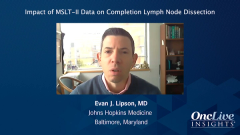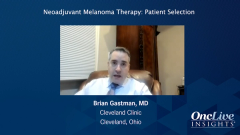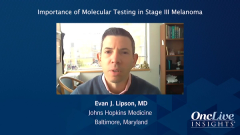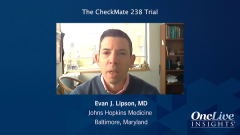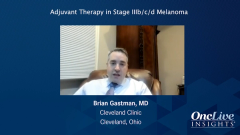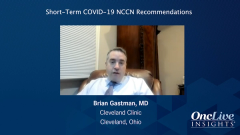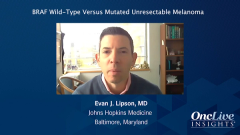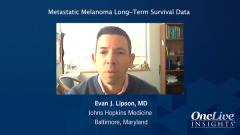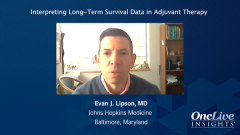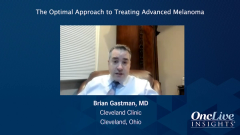
BRAF-Wild Type vs Mutated Unresectable Melanoma
Episodes in this series

Evan J. Lipson, MD: The clinical utility of molecular testing of the tumor at the outset of disease is important. It’s helpful to know what the genetic makeup of the patient’s tumor is right at the get-go. We support doing next-generation sequencing for the melanoma hotspot mutations even outside of BRAF, so NRAS, c-KIT, etc. This is good for knowing what clinical trial eligibility might look like, but it’s also good for understanding what some of the standard of care therapies might be: MEK inhibition for NRAS-mutated melanoma or imatinib therapy for c-KIT, for example.
The question about whether to send for repeat molecular testing at recurrence or progression is a good one. Most of the time, that does not bear much fruit, although there are some exceptions to that. When you’ve sent the initial sample, you’ll sometimes get a report back from the laboratory saying that that there was either insufficient tissue or there was a low yield on the sample. For whatever reason, the DNA couldn’t be amplified, or what have you. There, it is important to send another sample so that you’re sure that you’re getting the best information you can.
Another situation where it’s good to send more than 1 sample is in a patient who has had more than 1 primary melanoma, where there’s some uncertainty about what the metastatic lesion is. There, we will often send circulating tumor DNA [ctDNA], looking at the tumor mutations floating around in the bloodstream as a marker of what’s happening in the total body. There we have found that, with tumor mutation testing of the tissue, we have not seen mutation X. When we’ve sent it in the ctDNA, low and behold, we have found it. In general, we don’t send repeat molecular testing at recurrence or progression; however, there are some clinical scenarios where it is helpful to do so.
Our approach [at Johns Hopkins Medicine] to treating patients with metastatic melanoma differs a bit by several factors. Certainly, BRAF wild type vs mutant is a part of that. In any patient who is potentially eligible for a clinical trial, that is oftentimes our first consideration, and that’s consistent with the NCCN [National Comprehensive Cancer Network] guidelines that endorse clinical trial participation for appropriate patients.
Sometimes understanding the patient’s BRAF tumor status can speak to eligibility about targeted therapy options. In general, in patients where they have bulky disease, and the disease is often impeding the function of organs, we are enthusiastic about starting with up-front BRAF/MEK inhibitor therapy in a patient with BRAF-mutated melanoma because those therapies often work quickly, and you can sometimes reduce tumor burden within a matter of a couple of weeks.
In patients where the disease burden is not so high, we have a frank discussion about potential risks and benefits of starting with either targeted agents in the case of patients with BRAF-mutated melanoma or immune therapy. That’s a lengthy patient-by-patient discussion about what the short-term toxicities and benefits might be as well as what we know about the long-term toxicities and benefits of either of those options. It’s not an across the board answer for all patients. It certainly differs patient to patient.
In the era of COVID-19 [coronavirus disease 2019], patients are often more enthusiastic about a therapy they can take at home, where they don’t have to come into the health care setting. But as we’ve learned how to keep patients safe in the COVID-19 era, we’re seeing that patients are more and more willing to come into the hospital, undergo infusions, and receive treatment.
Transcript edited for clarity.


